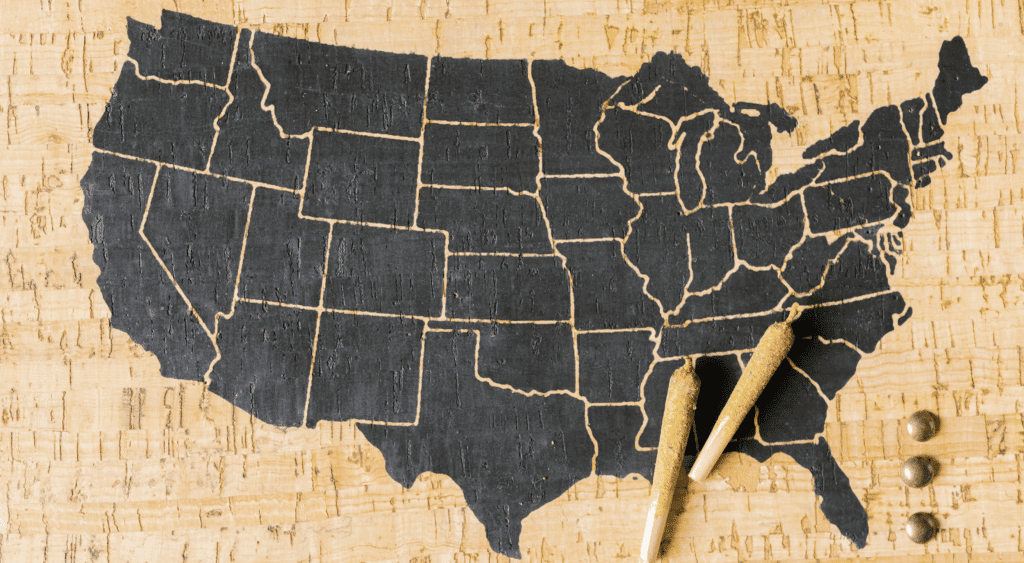Author
Freedom Road
Share
Author
Freedom Road
Share

The status of marijuana nationwide has experienced significant changes in recent years as more and more states introduce and pass legislation that legalizes both recreational and medical uses of cannabis and its derived compounds, like cannabidoil in oils.
However, if you possess a medical marijuana card and will be traveling, you might be wondering whether you can use that card in a different state. Or maybe you’re moving to a state without as much access to cannabis and wonder if you can keep your old medical marijuana card and cross state lines to get what you need. No matter your situation, it’s important that you stay on top of how medical marijuana cards work and the reciprocity that exists between some—but not all—states.
What is a medical marijuana card?
A medical marijuana card allows someone to purchase and possess cannabis for medical purposes. Doctors and healthcare providers are becoming increasingly more willing to prescribe cannabis as a potential treatment for issues ranging from chronic pain to nerve and muscle control conditions, such as epilepsy.
People who use marijuana as part of medical treatment can be granted a medical marijuana card so that, even in states where recreational use is not permitted, they can still possess cannabis without penalty. Each state’s rules for acquiring one will be different, however, so be sure to check with your state’s rules and guidelines.
The Medical Marijuana Application
When applying for a medical marijuana card, be aware that third-party misinformation from unreliable sources could land you in trouble. Some dispensaries might suggest, for instance, that simply having proof of your diagnosis and application is enough to function as a temporary marijuana card until you receive an official one. However, this is not true in the majority of states, and doing so could have significant legal and financial ramifications.
Adults who would like to apply for a medical marijuana card will need a state ID as well as other identifying information, like their Social Security number. Then, most states will allow you to upload your provider’s certifications (sometimes from more than one provider) to an online account. You’ll typically need to pay a processing fee, as well, which can range from $20 to $150 depending on the state. Colorado charges $29.50, while Oklahoma’s fee is $100 unless you can prove that you are a Medicaid/Medicare recipient or a 100% disabled veteran.
Medical Marijuana Card Renewal
Medical marijuana cards don’t last indefinitely and renewal is mandatory no matter where you live. In most states, these cards must be renewed once per year, but don’t wait until the last minute! Some applications can take 30 or even 60 days to process.
Types of Medical Cannabis Cards
Once you’ve qualified for a medical marijuana license, you’ll need to know what type of card you have: temporary or out-of-state. Each will afford you certain benefits and come with restrictions that, if not followed, could result in the loss of your medical cannabis license.
Temporary Medical Marijuana Cards
A temporary medical marijuana card works in much the same way as a temporary driver’s license, serving as provisional authorization in the time between your application being approved and you receiving your official card. During this interim period, you may use a temporary card that allows you to access all of the benefits you’d receive from your regular medical marijuana license.
In some states, like Michigan, the email indicating that your application was approved serves as your temporary medical marijuana card. You can print it out and show it as needed until your official license arrives.
Temporary licenses can also be granted to visitors of certain states. In these states, your typical medical card might not be acceptable because of reciprocity rules—discussed below—but you can still access the cannabis market with a temporary card.
Out-of-State
An out-of-state license is a medical marijuana card you hold from one state while you are in or trying to purchase cannabis from another state. Some states will allow this practice via reciprocity rules, while others cannot accept an out-of-state card. If you cannot use an out-of-state license where you are, you’ll need to either acquire a temporary card for that state or abstain from purchasing marijuana in that state.
Be aware that no matter what kind of medical cannabis card you have or what a state’s reciprocity rules are, you cannot bring marijuana across state lines. Doing so is considered drug trafficking, regardless of whether or not you have a medical card, and punishable by federal law.
Understanding Reciprocity
Reciprocity refers to whether or not states will allow residents of other states to purchase marijuana there. In other words, if you live in Florida, are you allowed to purchase medical marijuana when you visit New Jersey? Because New Jersey has reciprocity with other states, dispensaries will accept out-of-state cards as long as you don’t stay in New Jersey for more than six months, after which you’d need an in-state card.
Always be sure to check the specific regulations for each state. Even if they have reciprocity, they may have limiting conditions like New Jersey’s six-month rule.
In general, states considered to have fairly lenient reciprocity rules are:
- Delaware
- Louisiana
- Arizona
- Washington, D.C.
- New Mexico
- Maine
- Michigan
- New Hampshire
- Nevada
- New Jersey
Other states have reciprocity as long as you acquire a temporary card while you’re in the state. Those are:
- Arkansas
- Hawaii
- Maryland
- Oklahoma
What states have legal medical marijuana?
If you’re visiting a state that doesn’t have reciprocity, you may still be able to legally purchase medical marijuana. Even if a state does not accept your medical marijuana card, marijuana may be legally available throughout the state more broadly. These states are called adult-use states, and they may have rules regarding what ages are allowed to purchase marijuana and what kinds can be purchased, i.e. recreational, medical, or both.
States that allow for adult recreational purchases are:
- Alaska
- Arizona
- California
- Colorado
- Connecticut
- Delaware
- Illinois
- Maine
- Maryland
- Massachusetts
- Michigan
- Missouri
- Montana
- Nevada
- New Jersey
- New York
- Oregon
- Vermont
- Virginia
- Washington
- Washington D.C.
In these states, medical marijuana may or may not be available. Sometimes, medical patients are restricted to acquiring cannabis at a recreational dispensary.
In contrast, some states do not permit the acquisition of cannabis within the state at all, regardless of whether you have a medical marijuana card. These states are:
- Idaho
- Indiana
- Kansas
- Kentucky
- Nebraska
- North Carolina
- South Carolina
- Tennessee
- Texas
- Wisconsin
- Wyoming
Utah and Mississippi are currently reviewing their cannabis legislation, and changes may be coming soon.
Frequently Asked Questions About Medical Cannabis Cards
Using a medical cannabis card across state lines can be confusing. The wide range of reciprocity rules, legalization statuses, and more often makes people wary of attempting to purchase medical marijuana outside of their home state.
In what states can I use my medical marijuana card?
To determine whether you can use your medical marijuana card in a particular state, you’ll need to check whether that state has reciprocity. If it does, do you meet the requirements, like visiting only for a certain period of time? If it doesn’t, what is the legalization status of marijuana in that state? If you’re in a state where marijuana is not legal in any form, you will not be able to purchase or consume medical marijuana.
Can I use a medical marijuana card for recreational marijuana?
Typically, no. The reason for this is that, in most states that permit the recreational use of cannabis, there is an additional tax levied on the substance when used for non-medical purposes. Therefore, using a medical marijuana card to purchase recreational marijuana would provide a way to avoid paying taxes, which is why states don’t usually let this happen.
That being said, it’s possible that a state may offer recreational marijuana but not have reciprocity with your medical card from another state. If this happens, you will simply need to purchase recreational cannabis according to the state’s applicable laws, as if you did not have a medical cannabis card at all.
Can I get a medical marijuana card if I’m a visitor or not a resident?
In short, it depends on the state. Some states, like Oklahoma, require you to apply for and receive a temporary medical marijuana card if you want to make medical cannabis purchases while you visit. Other states, like Louisiana, have reciprocity rules that allow you to use the medical marijuana card you already have. Check each state’s laws and regulations to understand whether you’ll be required to get a temporary card when you get there.
Take the Mystery Out of Medical Marijuana with Freedom Road
At Freedom Road, we believe in helping our customers find their own roads to better health. From guaranteeing the safe, potent, and effective locally-sourced medical marijuana products you deserve to providing you with the reliable and accurate information you need, Freedom Road is here to create a positive cannabis experience.
For more on medical marijuana, visit us online for state-specific FAQs, or visit us in person at one of our locations in Oklahoma City or Trinidad, Colorado. We’re familiar with the complexities of medical marijuana laws and are eager to help you navigate them. Whether you need help applying for a card or finding a provider, or just want to stay up-to-date on the latest changes, Freedom Road is your trusted partner for all things cannabis.
One Comment
Comments are closed.


[…] has relatively flexible laws for medical marijuana as compared to other states. Patients as young as 18 can apply for a license, and caregivers can apply on behalf of minors. The […]